

Sopa is bad legislation, tweets EU's internet tsar. The EU's internet tsar has added her voice to resistance to the Stop Online Piracy Act (Sopa) in an unusually open comment on US legislation.
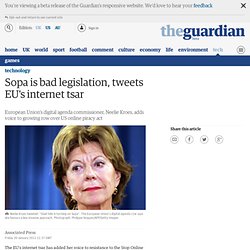
Congress Puts SOPA and PIPA on Hold. Update (11:15 a.m.
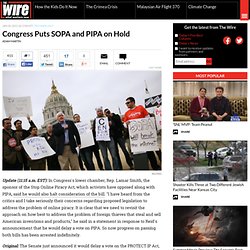
EST): In Congress's lower chamber, Rep. Wikipedia blackout: The site’s SOPA shutdown is a brilliant tactic that it should never use again. Twitter didn’t actually call Wikipedia “foolish” for its decision to go dark Wednesday in protest of a proposed anti-piracy law, as some breathless blogs reported.
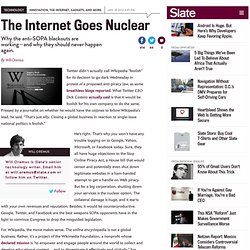
What Twitter CEO Dick Costolo actually said is that it would be foolish for his own company to do the same. Pressed by a journalist on whether he would have the cojones to follow Wikipedia’s lead, he said, "That's just silly. Closing a global business in reaction to single-issue national politics is foolish. " He’s right. That’s why you won’t have any trouble logging on to Google, Yahoo, Microsoft, or Facebook today.
For Wikipedia, the move makes sense. Other websites that censored themselves Wednesday had their own good reasons for going nuclear. What’s remarkable about this protest is not that companies like Google aren’t doing more—it’s that they’re doing as much as they are. Stop Online Piracy Act and Protect IP Act, a pair of bills that threaten Internet freedom. Photograph by Sean Gallup/Getty Images.

The United States of America was forged in resistance to collective reprisals—the punishment of many for the acts of few. In 1774, following the Boston Tea Party, the British Parliament passed a series of laws—including the mandated closure of the port of Boston—meant to penalize the people of Massachusetts. These abuses of power, labeled the “Intolerable Acts,” catalyzed the American Revolution by making plain the oppression of the British crown. More than 200 years later, the U.S. Internet Regulation & the Economics of Piracy. Earlier this month, I detailed at some length why claims about the purported economic harms of piracy, offered by supporters of the Stop Online Piracy Act (SOPA) and PROTECT-IP Act (PIPA), ought to be treated with much more skepticism than they generally get from journalists and policymakers.
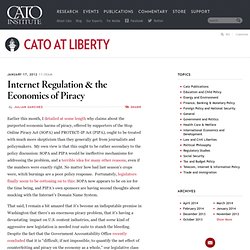
My own view is that this ought to be rather secondary to the policy discussion: SOPA and PIPA would be ineffective mechanisms for addressing the problem, and a terrible idea for many other reasons, even if the numbers were exactly right. No matter how bad last season’s crops were, witch burnings are a poor policy response. Fortunately, legislators finally seem to be cottoning on to this: SOPA now appears to be on ice for the time being, and PIPA’s own sponsors are having second thoughts about mucking with the Internet’s Domain Name System.
Megaupload file-sharing site shut down, founders charged. Megaupload, one of the internet's largest file-sharing sites, has been shut down by officials in the US.
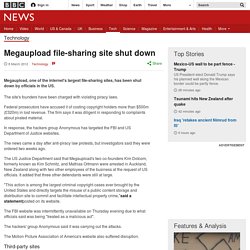
The site's founders have been charged with violating piracy laws. Federal prosecutors have accused it of costing copyright holders more than $500m (£320m) in lost revenue. The firm says it was diligent in responding to complaints about pirated material. In response, the hackers group Anonymous has targeted the FBI and US Department of Justice websites.
The news came a day after anti-piracy law protests, but investigators said they were ordered two weeks ago. MegaUpload Alternatives See Surge in Traffic After Shutdown. After losing access to their favorite file-hosting service last week, millions of former MegaUpload users have fled to the many alternatives available.
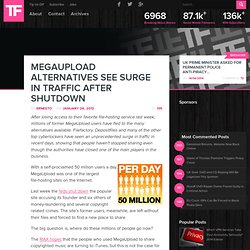
Filefactory, Depositfiles and many of the other top cyberlockers have seen an unprecedented surge in traffic in recent days, showing that people haven't stopped sharing even though the authorities have closed one of the main players in the business. With a self-proclaimed 50 million users a day, MegaUpload was one of the largest file-hosting sites on the Internet. Last week the feds shut down the popular site accusing its founder and six others of money-laundering and several copyright related crimes. The site’s former users, meanwhile, are left without their files and forced to find a new place to share. Mega Aftermath: Upheaval In Pirate Warez Land.
While last week's shutdown of MegaUpload is of huge interest in itself, but a wave of aftershocks and side-effects are proving equally fascinating to watch.

In addition to causing all sorts of problems for legitimate users of file-sharing services, there is no avoiding the fact that certain elements of the piracy scene are in a mess. But amazingly, still the beat goes on. Despite its “rogue site” status and various other warnings, when MegaUpload went down last week it still came as a shock. But what came next was unprecedented, a dramatic reaction in cyberlocker land that took out vast libraries of digital content and capacity.
Cyberlocker Burden of Proof Should Be Reversed, Anti-Piracy Group Says. An anti-piracy group say they have monitored decreased usage of cyberlockers that withdrew their rewards programs in the wake of the Megaupload shutdown and increases for those that maintained them.
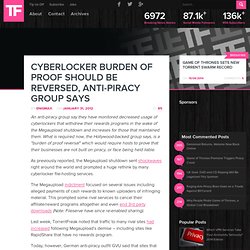
What is required now, the Hollywood-backed group says, is a "burden of proof reversal" which would require hosts to prove that their businesses are not built on piracy, or face being held liable. After Megaupload: 7 Sites the FBI Might Target Next? On January 19th, the United States Department of Justice put the hammer down on file sharing site Megaupload, by charging its owners with online copyright infringement.
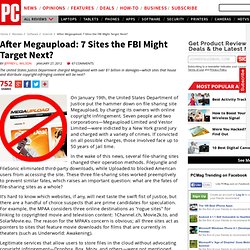
Seven people and two corporations—Megaupload Limited and Vestor Limited—were indicted by a New York grand jury and charged with a variety of crimes. If convicted on all possible charges, those involved face up to 50 years of jail time. RapidShare Attorney: If We're Shut Down Like Megaupload, Then YouTube, Dropbox, Apple's iCloud Are Next. There's been near nuclear fallout from federal prosecutors shuttering of Megaupload, the file-sharing service accused of costing the entertainment industry $500 million in lost revenues.
It's estimated that shutting down Megaupload's family of websites, which are accused of hosting massive amounts of copyrighted files, affected 1% of all Internet traffic. The feds are seeking the forfeiture of $175 million from Megaupload's flamboyant founder, Kim Dotcom; sympathetic hacker coalition Anonymous has since launched online attacks against the RIAA, MPAA, and Justice Department; and file-sharing and cloud services from FileSonic to Dropbox are wondering what this could mean for the industry. On Tuesday, we caught up with RapidShare attorney and spokesman Daniel Raimer. Megaupload: A Lot Less Guilty Than You Think. The recent Department of Justice decision to indict Megaupload for copyright infringement and related offenses raises some very thorny questions from a criminal law perspective.
A few preliminaries: I’m responsible for the musings below, but I thank Robert Weisberg of Stanford Law School for taking the time to talk through the issues and giving me pointers to some relevant cases. Also, an indictment contains unproven allegations, and the facts may well turn out to be different, or to imply different things in full context.
DMCA SAFE HARBOR: BELIEVE IT AND IT WILL BECOME REAL: As a matter of criminal law, the discussion of whether Megaupload did what it needed to do to qualify for the DMCA Safe Harbor misses the point. Did they register an agent? Did they have a repeat infringer policy? In other words, for criminal liability, it doesn’t really matter whether the service qualifies, so long as Defendants believed it qualified. MegaUpload User Data Soon to be Destroyed. MegaUpload has received a letter from the US Attorney informing the company that data uploaded by its users may be destroyed before the end of the week. The looming wipe-out is the result of MegaUpload's lack of funds to pay for the servers. Behind the scenes, MegaUpload is hoping to convince the US Government that it's in the best interest of everyone involved to allow users to access their data, at least temporarily.
In the wake of the MegaUpload shutdown many of the site’s users have complained about the personal files that were lost as collateral damage. From work-related data to personal photos, the raid disabled access to hundreds of thousands, perhaps millions, of files that are clearly not infringing. A recent announcement by the US Attorney now suggests that these files may soon be lost forever. Pirate Party of Catalonia wants to sue FBI, in Spain, over Megaupload seizure. Two lessons from the Megaupload seizure. Two events this week produced some serious cognitive dissonance. First, Congressional leaders sheepishly announced that they were withdrawing (at least for the time being) two bills heavily backed by the entertainment industry — the PROTECT IP Act (PIPA) in the Senate and Stop Online Piracy Act (SOPA) in the House – in the wake of vocal online citizen protests (and, more significantly, coordinated opposition from the powerful Silicon Valley industry).
Critics insisted that these bills were dangerous because they empowered the U.S. Government, based on mere accusations of piracy and copyright infringement, to shut down websites without any real due process. Megaupload Shutdown Targets Pirates ... And Legitimate Files. Meganomics: The Future of “Follow-the-Money” Copyright Enforcement. Megaupload: Hong Kong Mulls Copyright Crackdown. In the wake of the Megaupload shutdown, authorities in Hong Kong say they will set up a center to investigate electronic crime and copyright infringement later this year.
Megaupload case near collapse: report. High performance access to file storage. The Escapist: News : Megaupload Wins Evidence Disclosure Battle. Things are looking up a bit for Megaupload founder Kim Dotcom, following a ruling by a New Zealand court that the U.S. government must turn over the evidence it has against the company so he can properly defend himself against its extradition request. A mega attack on internet freedom. Hotfile As Bad As Megaupload, MPAA Tells Court. Anonymous downs government, music industry sites in largest attack ever. Filesonic Kills File-Sharing Service After MegaUpload Arrests. Filesonic, one of the Internet's leading cyberlocker services, has taken some drastic measures following the Megaupload shutdown and arrests last week. In addition to discontinuing its affiliates rewards program and not yet paying accrued money to members, the site has disabled all sharing functionality, leaving users only with access to their own files. Cyberlocker Ecosystem Shocked As Big Players Take Drastic Action.
Cyberlocker To Shut Down After PayPal Ban. SOPA & PIPA. Copyrights Wake: SOPA, James Joyce, and the Future of Intellectual Property. Copyright Industry Calls For Broad Search Engine Censorship. The Target Isn’t Hollywood, MPAA, RIAA, Or MAFIAA: It’s The Policymakers. Gaiman: SOPA and PIPA are on the wrong side of history. Netflix creates pro-SOPA super-PAC. CISPA isn’t SOPA 2.0, but you should still be wary of the latest congressional tech bill. Insanity: CISPA Just Got Way Worse, And Then Passed On Rushed Vote. CISPA Bill Quickly Passes in the House. Facebook and Google Turned Into Government Spies? The Dangerous New Law Before Congress (CISPA)
What Everyone Who Uses The Internet Needs To Know About CISPA. Down with CISPA - By Trevor Timm. The Legislation That Could Kill Internet Privacy for Good - Conor Friedersdorf - Politics.